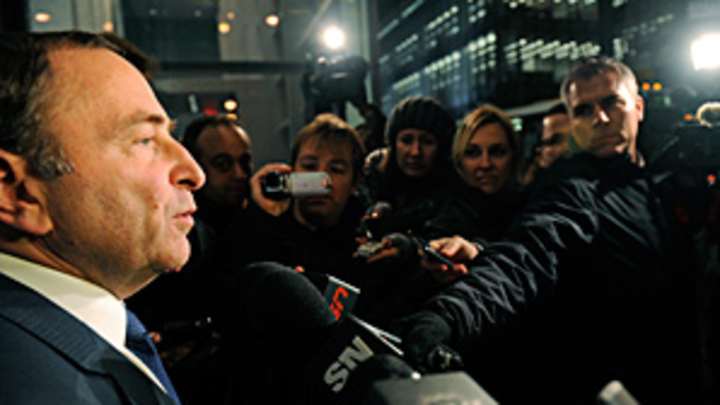Mediator saved NHL's CBA talks


NEW YORK (AP) -- The player who joins the storied list of NHL MVPs in the upcoming shortened season owes at least a share of it to federal mediator Scot Beckenbaugh, who won't lace up a skate but may be the biggest reason the league is back on the ice.
Beckenbaugh orchestrated a frenetic final 48 hours of negotiations that eventually produced a tentative deal between the league and the players early Sunday morning that will end the four-month lockout and save the season.
"I would be remiss if we didn't thank Scot Beckenbaugh for his assistance in the mediation process," NHL Commissioner Gary Bettman said during a brief news conference early Sunday morning.
HACKEL: Why deal went down now
The mediator's constant three-block walks over 13 hours Friday between the NHL office and the hotel in which union representatives were staying laid the groundwork, calmed the anger, built the trust, and brought the sides back to the bargaining table for the 16-hour talks that finally led to an agreement.
"Scot was great for a number of reasons," said Winnipeg Jets defenseman Ron Hainsey, a key member of the union's negotiating team. "When it got to points you didn't know what to do next, you could go to him and talk to him about it and there was a way to work your ideas through a third party who was really able to help the process."
Beckenbaugh couldn't bring the sides to a deal in late November over two days of talks in New Jersey, and he left the process agreeing that the sides were far apart.
But he returned this week after also helping back in the 2004-05 NHL lockout that ultimately resulted in a totally lost season.
No one wanted a repeat of that, especially Bettman and union executive director Donald Fehr, who became the negative faces for fans who just hoped for hockey to return.
"Hopefully we'll get back to what we used to call business as usual just as fast as we can," Fehr said. "Hopefully within just a very few days the fans can get back to watching people who are skating and not the two of us."
Beckenbaugh went back and forth Friday, talking to union officials and then with NHL executives, and so on and so on. The two sides weren't in the same room talking to each other with only a few days left before Bettman's deadline to make a deal that would allow for a season to be played. But both said progress was being made from afar.
It might have been hard to see and hard to believe, but the proof was clear when a tired and weary Bettman stood side-by-side with the equally exhausted Fehr and announced a tentative deal was in place.
Much earlier in the process, the sides all but agreed that they would split 50-50 all hockey-related revenue - a total that reached a league-record $3.3 billion last season in the final year of a collective bargaining agreement that introduced a salary cap to hockey for the first time in 2005.
Players had been receiving 57 percent in the old deal. When first hammered out, it seemed like a surefire win for the league, but the old CBA ended up being favorable to the players, too.
This time, the NHL wanted to curtail player contracts that had gotten out of hand both in their length and how they affected the salary cap by including seasons in which a player would take drastic cuts in pay to be more cap-friendly.
In return, the players fought for a pension plan they said was their biggest issue and something they wouldn't make a deal without.
It appears that was the most contentious portion of the new deal.
"The pension is the centerpiece of this deal for the players," Hainsey said. "We were making progress continually, and to make a deal you have to continue to make progress until it's over. That finally happened today.
"It took time. The pension is a very complicated issue. We were continuing to move on all of the issues all the way to the end. Those weren't final until the last proposal was made and accepted."
At times during the final hours of talking, Beckenbaugh waited in the background while the sides continued to work. Negotiations kept going without him, but the bargaining was buoyed because the NHL and the union knew he was there if trouble arose again.
These talks knew plenty of trouble and breakdowns and mistrust. As recently as talks that stretched into early Thursday, the process broke down. Beckenbaugh was there to fix the holes and get negotiations back on track.
Thursday was almost a lost day as the sides stayed apart, except for two small meetings that focused on isolated issues. Friday could have been more of the same if not for Beckenbaugh's treks that led to ideas being passed back and forth and a willingness and desire to return to the table.
On Saturday morning, Beckenbaugh started early with a conversation with union officials, then made his way to the league office. But this time when he walked back to the union's hotel, he brought Bettman and the NHL delegation with him.
Face-to-face negotiations began around 1 p.m., and outside of some breaks and internal caucuses, they didn't end until about 5 a.m. Sunday.
"It was a battle," Hainsey said. "Gary said a month ago it was a tough negotiation. That's what it was."
